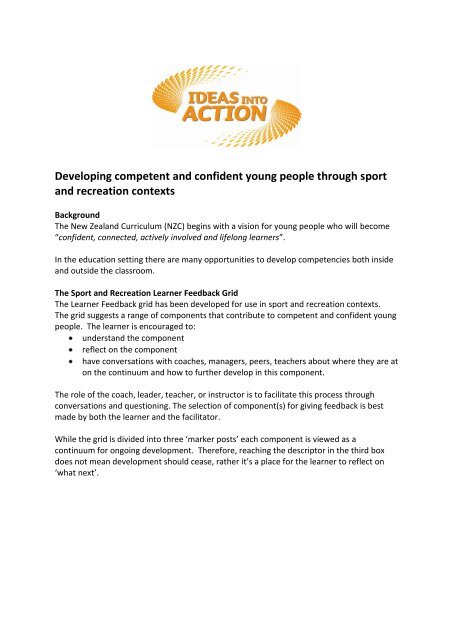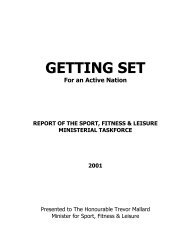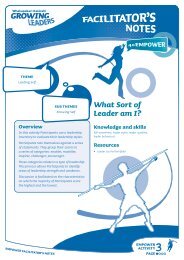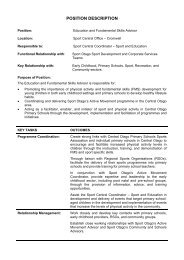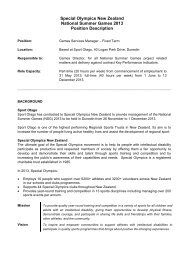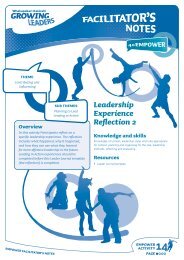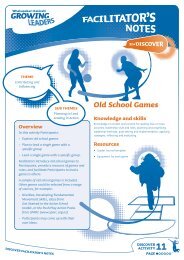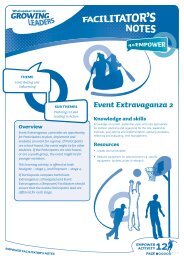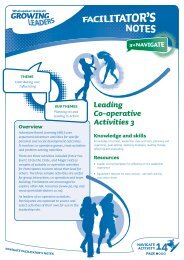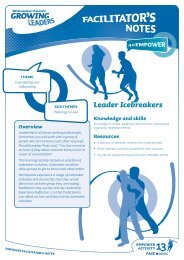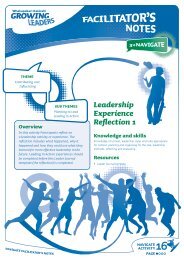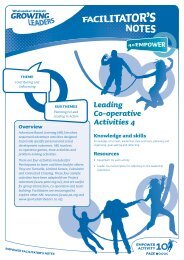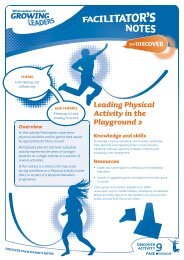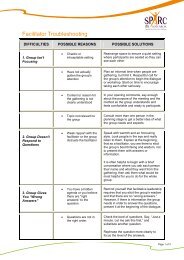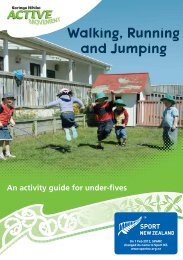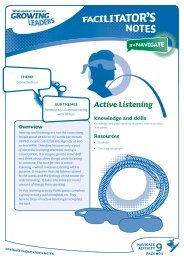Learner Feedback Tool (PDF, 504 Kb) - Sport New Zealand
Learner Feedback Tool (PDF, 504 Kb) - Sport New Zealand
Learner Feedback Tool (PDF, 504 Kb) - Sport New Zealand
You also want an ePaper? Increase the reach of your titles
YUMPU automatically turns print PDFs into web optimized ePapers that Google loves.
Developing competent and confident young people through sport<br />
and recreation contexts<br />
Background<br />
The <strong>New</strong> <strong>Zealand</strong> Curriculum (NZC) begins with a vision for young people who will become<br />
“confident, connected, actively involved and lifelong learners”.<br />
In the education setting there are many opportunities to develop competencies both inside<br />
and outside the classroom.<br />
The <strong>Sport</strong> and Recreation <strong>Learner</strong> <strong>Feedback</strong> Grid<br />
The <strong>Learner</strong> <strong>Feedback</strong> grid has been developed for use in sport and recreation contexts.<br />
The grid suggests a range of components that contribute to competent and confident young<br />
people. The learner is encouraged to:<br />
understand the component<br />
reflect on the component<br />
have conversations with coaches, managers, peers, teachers about where they are at<br />
on the continuum and how to further develop in this component.<br />
The role of the coach, leader, teacher, or instructor is to facilitate this process through<br />
conversations and questioning. The selection of component(s) for giving feedback is best<br />
made by both the learner and the facilitator.<br />
While the grid is divided into three ‘marker posts’ each component is viewed as a<br />
continuum for ongoing development. Therefore, reaching the descriptor in the third box<br />
does not mean development should cease, rather it’s a place for the learner to reflect on<br />
‘what next’.
Using the <strong>Sport</strong> and Recreation <strong>Learner</strong> <strong>Feedback</strong> Grid<br />
The feedback grid can be used in many ways, for example:<br />
a. By a coach with a complete team to:<br />
set team goals and direction for the season<br />
agree on and develop a team culture<br />
set the expectations and goals going into a tournament<br />
highlight to team members the opportunities for learning within their participation<br />
in sport and recreation.<br />
b. By a coach with individual players/athletes to:<br />
set goals<br />
discuss progress<br />
give feedback and feed-forward to individuals to assist their development and<br />
progress<br />
assist a player/athlete to determine ‘what next’<br />
highlight how individual development could bring further potential to the team.<br />
c. By a player/athlete to:<br />
set goals<br />
self reflect and self monitor progress and development against own goals.
Participating and contributing<br />
Potential key<br />
competency from<br />
NZC<br />
Components<br />
for<br />
developing<br />
young people<br />
<strong>Sport</strong> and Recreation <strong>Learner</strong> <strong>Feedback</strong><br />
Improved levels of confidence and competence<br />
Sample questions for conversations<br />
Active<br />
involvement<br />
Leadership<br />
‘Followship’<br />
Undertakes<br />
roles<br />
Performing<br />
physical skills<br />
Applying<br />
tactics/strategy<br />
Willing to be involved.<br />
Is willing to take the lead<br />
when asked in some<br />
situations.<br />
Willing to follow the lead of<br />
others and be guided by<br />
others.<br />
Willing to undertake some<br />
roles within games/practice/<br />
participation.<br />
Able to perform a range of<br />
fundamental movement<br />
skills.<br />
Recognises different tactics<br />
/strategies and when they are<br />
applied.<br />
Actively involved in most<br />
situations within<br />
games/practice/participation.<br />
Takes the lead when asked and<br />
positively influences the<br />
games/practice/participation for<br />
others.<br />
Follows the lead of others and<br />
their instructions in most<br />
situations within<br />
games/practice/participation<br />
Undertakes a range of roles<br />
within<br />
games/practice/participation.<br />
Demonstrates the basic activity<br />
specific skills in<br />
games/practice/participation.<br />
Demonstrates basic<br />
tactics/strategies in most<br />
situations within<br />
Consistent active involvement and<br />
contribution in all situations within<br />
games/practice/participation. Displays<br />
appropriate levels of energy,<br />
enthusiasm and engagement.<br />
Empowers others to lead and supports<br />
others to positively influence the<br />
games /practice/participation for all.<br />
Makes appropriate use of own<br />
constructive and inclusive leadership<br />
skills.<br />
Consistently supports the leadership of<br />
others in all situations within<br />
games/practice/participation.<br />
Consistently ‘steps up’ to undertake<br />
appropriate roles at the ‘right’ time in<br />
all situations. Contributes through<br />
these roles for the benefit of all.<br />
Consistently demonstrates<br />
comprehensive activity specific skills in<br />
games/practice/participation.<br />
Consistently demonstrates the ‘right’<br />
tactics/strategies at the ‘right’ time in<br />
games/practice/participation.<br />
Why is it good to get involved in sport and<br />
recreation?<br />
How involved do you want to get?<br />
What things stop you getting involved?<br />
How could you overcome these things?<br />
What does leadership look like?<br />
When do you show leadership?<br />
What things stop you leading?<br />
How could you overcome these things?<br />
How do you show you are willing to follow?<br />
How well do you follow the leadership of others?<br />
What gets in the way of you ability to listen or act<br />
co-operatively?<br />
What roles are there in your sport./recreation?<br />
What roles to you take on and why?<br />
What roles do you avoid taking on – and why?<br />
What would help you to take on different roles?<br />
What are the skills to play this game activity?<br />
How well do you perform the skills?<br />
What are the skills you need to develop next?<br />
How will you develop them?<br />
What are the different strategies and tactics used<br />
in this sport/recreation activity?<br />
How well do you apply them - accurately and at
Managing self<br />
Initiative<br />
Establishing<br />
personal goal/s<br />
Self<br />
responsibility<br />
Resilience<br />
Seeks<br />
knowledge and<br />
feedback<br />
Reliable<br />
Fair play<br />
Willing to try to make things<br />
happen.<br />
Understands that setting<br />
personal goals within sport<br />
and recreation has positive<br />
benefits.<br />
Acknowledges self<br />
responsible for their own<br />
learning and actions.<br />
Approaches each opportunity<br />
to participate positively.<br />
Willing to ask for feedback<br />
and further knowledge in<br />
some situations.<br />
Knows when to be at the<br />
games/practice/participation.<br />
Aware of what Fair Play<br />
consists of ‘in action’ and<br />
agrees to attempt to uphold<br />
principles of fair play.<br />
games/practice/participation.<br />
Sees opportunities and tries to<br />
make things happen from time to<br />
time.<br />
Sets personal goal/s that relate to<br />
sporting/recreational or personal<br />
development and achievement<br />
within a sport/recreation context.<br />
Tries to achieve goals.<br />
Tries to take self responsibility for<br />
own learning and actions in<br />
game/practice/participation.<br />
Maintains composure throughout<br />
the games/practice/participation<br />
and especially in times of<br />
adversity or disappointment.<br />
Tries to gather knowledge and<br />
seeks feedback in most<br />
situations. Acts on feedback.<br />
Is punctual to most activities with<br />
appropriate equipment and is<br />
ready for action.<br />
Plays fair, is respectful of others,<br />
of rules/ officials/environment in<br />
most situations within<br />
game/practice/participation.<br />
Consistently reads situations within<br />
games/practice/participation and<br />
makes thing happen.<br />
Sets realistic personal goal/s that<br />
relate to sporting/recreational or<br />
personal development and<br />
achievement. Uses range of key<br />
competency capabilities to work<br />
towards achieving goals.<br />
Consistently takes self responsibility<br />
for own learning and actions. Selfresponsibility<br />
enables the leaner to be<br />
independent and self directed in own<br />
learning.<br />
Through role-modeling encourages<br />
others to remain positive, composed<br />
and focused during the activities.<br />
Consistently bounces back from<br />
disappointment.<br />
Pro-active in seeking knowledge and<br />
feedback that will enable<br />
development, or improve their<br />
experience. Always acts on feedback.<br />
Is always on time, organised, with<br />
appropriate equipment. Always makes<br />
timely contact if not able to attend.<br />
Consistently upholds the principles of<br />
fair play and encourages others to do<br />
so. Shows exemplary respect for the<br />
rules, opponents, officials, decision<br />
and environment. Displays integrity.<br />
the right time?<br />
What strategies and tactics do you need to<br />
develop?<br />
How will you develop them?<br />
How well do you make things happen?<br />
How often do you make things happen?<br />
What things can you do to make things happen?<br />
How well do you set goals – short and long term?<br />
What are your goals about e.g. personal<br />
development, achievement, results?<br />
How well do you check progress on your goals?<br />
What would help you to set and achieve higher<br />
goals?<br />
What does taking self responsibility look like?<br />
How well do you take responsibility for your<br />
learning?<br />
How well do you take responsibility for your<br />
actions during games/practices/activities?<br />
How positively do you approach your<br />
games/practices/participation?<br />
How well do you stay composed under pressure or<br />
when disappointed?<br />
What do you to get over disappointments?<br />
How often do you look for/ask for feedback?<br />
How well do you take new knowledge on board?<br />
How well do you act on feedback?<br />
How do you show that you value feedback?<br />
How well can others expect you to be:<br />
where you are meant to be,<br />
when you are meant to be there,<br />
with everything you need to play?<br />
What can you do to meet these expectations?<br />
How fair are you as a player?<br />
What are the times when you find it is easier or<br />
harder to fair play?<br />
How well do others see you as a person who<br />
upholds Fair Play?<br />
What are the best things you can do to play fair?
Relating to others<br />
Thinking<br />
Listening<br />
Working with<br />
others<br />
Aware of the need to listen,<br />
and is willing to do so, but<br />
can be distracted.<br />
Willing to co-operate with<br />
others. Agrees that good<br />
social and co-operative skills<br />
are important and tries to use<br />
them within<br />
game/practice/participation.<br />
Listens actively in most situations<br />
within game<br />
/practice/participation.<br />
Participates co-operatively with<br />
others. Uses a range of good<br />
social and interpersonal skills in<br />
most situations within<br />
game/practice/participation.<br />
Active listener in all situations within<br />
game/practice /participation. Body<br />
language and responses shows they<br />
are listening actively.<br />
Consistently participates cooperatively<br />
and constructively with<br />
others. Support others through the use<br />
of positive and well-developed social<br />
and interpersonal skills in all<br />
situations.<br />
What does an active listener look like?<br />
What is the advantage of being a good listener<br />
How good a listener are you?<br />
What can you do to be a better listener?<br />
How well do you ask good questions?<br />
Why is it good to work well with others?<br />
How positive are your actions and words during<br />
games/practices?<br />
How co-operative are you in all situations during<br />
games/practices?<br />
When you are negative how can make these<br />
words and action positive?<br />
Empathy<br />
Negotiating<br />
Supporting<br />
others<br />
Cultural respect<br />
Understanding<br />
the<br />
game/practice/<br />
participation<br />
Building<br />
knowledge<br />
Aware of and identifies with<br />
another's feelings.<br />
Acknowledges different<br />
opinions and attempts to<br />
negotiate with one or more<br />
people to reach a satisfactory<br />
resolution.<br />
Acknowledges the benefits of<br />
and ways to be supportive of<br />
others.<br />
Acknowledges the different<br />
cultures of other participants<br />
within<br />
games/practice/participation.<br />
Has knowledge of goal of<br />
games/practice/participation<br />
and basic rules of the<br />
games/practice/participation.<br />
Aware of why they need new<br />
knowledge and recognises<br />
new knowledge (technical<br />
Identifies with and responds to<br />
the feelings of others in most<br />
situations within game /practice<br />
/participation.<br />
Successfully negotiates with one<br />
or more people to reach a<br />
satisfactory resolution in most<br />
situations within<br />
game/practice/participation.<br />
Positively supports others in most<br />
situations within<br />
games/practice/participation.<br />
Respects the different cultures of<br />
other participants in most<br />
situations within<br />
games/practice/participation.<br />
Has knowledge of goal,<br />
comprehensive rules and basic<br />
tactics and strategies of the<br />
game/practice/participation.<br />
Tries to adopt new technical and<br />
tactical knowledge. Can show or<br />
explain this improved<br />
Consistently able to show empathy to<br />
others. Able to put self in the place of<br />
the other person. Seeks to<br />
appropriately influence the sport or<br />
recreation environment in response to<br />
the feelings of others.<br />
Consistently recognises when and how<br />
to negotiate so that all parties reach a<br />
satisfactory resolution. Demonstrates<br />
understanding that compromise may<br />
be necessary in negotiations.<br />
Consistently displays attitudes and<br />
values that support others during all<br />
situations within<br />
games/practice/participation. Selfless.<br />
Consistently acts in a respectful way<br />
toward the different cultures of other<br />
participants in all situations within<br />
games/practice/participation.<br />
Has knowledge of goal, comprehensive<br />
rules, and effective tactics and<br />
strategies of the game/<br />
practice/participation.<br />
Consistently strives to seek and display<br />
new technical and tactical knowledge.<br />
Engages in the process of in the<br />
What happens when you are considerate and<br />
inconsiderate?<br />
How well do you consider the feelings of other<br />
people?<br />
What can you do to make sport and recreation<br />
better for others?<br />
What does a win-win solution look like during<br />
games/practice?<br />
What is the advantage of win –win situations?<br />
What can you do to achieve win-win situations?<br />
Why is it good to support your team mates?<br />
Which actions show you contribute to a positive<br />
atmosphere in the group?<br />
What stops you or helps you show these actions?<br />
What happens when you are negative to someone<br />
else’s culture?<br />
Is difference in terms of culture is a good thing?<br />
How do your words and actions show what you<br />
think about different cultures?<br />
What ways show you respect people’s culture?<br />
How well do you know:<br />
the goals of the activity?<br />
the rules of the activity?<br />
the strategies and tactics to use?<br />
How well do you build knowledge about being an<br />
effective player/participant through:<br />
technique?
Using language, symbols, and texts<br />
Decision-making<br />
Creative and<br />
enterprising<br />
solutions<br />
Reflection inaction<br />
and onaction<br />
Understanding<br />
information<br />
Using<br />
information<br />
(technical and<br />
tactical)<br />
Using<br />
information<br />
(language, signs,<br />
signals)<br />
‘Reading’<br />
movement<br />
and tactical). understanding. building of knowledge for self and<br />
others.<br />
Identifies different technical<br />
and/or tactical options.<br />
Awareness that there may be<br />
more than one solution/idea.<br />
Understands solutions when<br />
generated by others.<br />
Reflects on some aspects of<br />
games/practice/participation<br />
and suggest possible changes<br />
for self.<br />
Attempts to understand and<br />
engage with information.<br />
Recognises different technical<br />
and tactical information and<br />
attempts to use it.<br />
Attempts to use the<br />
language, signs and signals<br />
that are part of the<br />
games/practice/participation.<br />
Aware of the language of<br />
sport and recreation.<br />
Tries different technical and/or<br />
tactical options and can give<br />
reasons for decisions.<br />
Can see new solutions/ideas and<br />
more effective ways in some<br />
contexts.<br />
Reflects during and after<br />
games/practice/participation and<br />
tries to make necessary changes.<br />
Understands technical and<br />
tactical information and can act<br />
on this within the context of the<br />
game/practice/ participation.<br />
Understand technical and<br />
tactical/ strategic aspects and<br />
knows when to translate these<br />
into actions.<br />
Use of the language, signs and<br />
signals that are part of the games<br />
/practice/participation is<br />
appropriate<br />
Tries to ‘read’ situations within<br />
the game/ practice/participation<br />
and can respond to this<br />
information.<br />
Technical and/or tactical options<br />
selected have most likelihood of<br />
success and can justify why/how that<br />
is the case.<br />
Consistently sees and actively seeks<br />
new ideas or more effective ways - for<br />
practice, tactics, strategies and plays,<br />
improving focus and involvement.<br />
Consistently and accurately selfreflects<br />
on all aspects during and after<br />
games/practice/participation and<br />
makes appropriate changes.<br />
Consistently understands and applies<br />
technical and tactical information<br />
appropriately in relation to game/<br />
practice/participation.<br />
Displays a quick, clear and<br />
comprehensive understanding of<br />
technical and tactical/strategic aspects<br />
and can translate this into appropriate<br />
actions.<br />
Consistently and effectively uses the<br />
language, signs and signals that are<br />
part of the games/practice/<br />
participation.<br />
Consistently able to ‘read’ information<br />
available within movement and body<br />
language and responds quickly and<br />
appropriately.<br />
tactics, strategy?<br />
respecting and getting on with others?<br />
How well do you make good technical / tactical<br />
decisions?<br />
How much do you rely on others to tell me?<br />
How do you know your decisions are good or not?<br />
Describe why you chose that move/pass/strategy?<br />
How well do you seek better or different ways of<br />
doing things?<br />
When others give solutions, how well do you<br />
understand them?<br />
What do you think is going to happen next?<br />
How much do you rely on others to tell you?<br />
How often do you reflect on your<br />
play/participation and make good changes?<br />
How well do you understand:<br />
the techniques?<br />
Strategies?<br />
how to be motivated, focused?<br />
How often do your actions show you understand?<br />
What are the best strategies to use at different<br />
times?<br />
How well do you use techniques/ strategies?<br />
How well do know:<br />
the “language” of the game / activity? E.g.<br />
rules, umpire signals.<br />
when to use the right ones at the right time?<br />
How often do you use the right ones?<br />
How well do you see what is going on around you?<br />
How well do you respond to what is going on<br />
around you?


